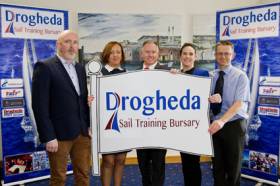Displaying items by tag: Drogheda Sail Training Bursary
Launch of Drogheda Sail Training Bursary Makes Waves
#TallshipBursary - The launch of the Drogheda Sail Training Bursary from sponsor Drogheda Port Company took place on Friday 28th April.
The launch marked a unique new sponsorship structure between Public and Private enterprise from the locality. Drogheda Port Company and Louth County Council have teamed up with Irish Cement and Fast Terminals to form the new financial driver of this remarkable youth sail training initiative which is going from strength to strength. The four sponsoring partners are very strong advocates of social corporate responsibility and are committed to the growth and longevity of this bursary scheme.
Although Drogheda is a very proud maritime town the reality is most local youngsters have little experience of anything maritime. In 2013 Drogheda Port Company and Sail Training Ireland joined forces and established the Drogheda Sail Training Bursary in a bid to change that but in a unique and self-educating way.
Sail Training Ireland is the National Sail Training Organisation and a charity with youth development at its core, its patron is President Michael D Higgins. The Drogheda Sail Training Bursary was the first of its kind in Ireland, the anchor scheme, which has led to the subsequent development of similar bursaries in Cork, Belfast, Waterford and Derry so far.
Sail training requires participants to confront many demanding challenges, both physical and emotional. It is an activity that inspires self-confidence and the acceptance of personal responsibility. It promotes an acceptance of others whatever their social or cultural backgrounds, and develops a willingness to take controlled risks. For most who undertake sail training it is a positive life-changing experience.
To date the Drogheda Sail Training Bursary has funded 8 amazing voyages for 72 local youths. Going forward the aim is development and progression and to offer international voyages on world class Tall Ships. None of this would be possible without the local bursary sponsors, Irish Cement, Fast Terminals, Louth County Council and Drogheda Port Company, who are all very committed to this initiative.
To date the scheme has been oversubscribed each year with the participation of sponsoring organisations and schools such as St Mary’s Diocesan School, C.A.B.L.E & Foroige youth projects, Greenhills School, Drogheda Grammar School, Scoil Ui Mhuiri Dunleer, Ardee Community School, Colaiste na hInse Bettystown, Louth and Meath ETB, Drogheda Youth Reach, 18th Meath Scouts & Dunshaughlin Girl Guides.
The scheme caters for young adults between the ages of 16 to 21 years and further information can be obtained from;
Nessa Lally, Drogheda Port Company, 041 9838378, [email protected]
Sara Mason, Sail Training Ireland, 01 8559597, [email protected]





























































